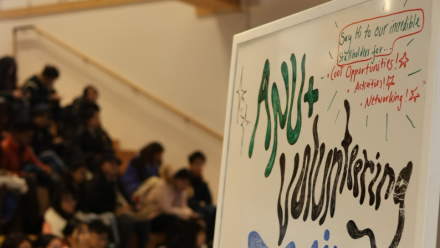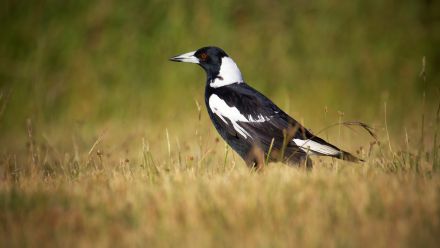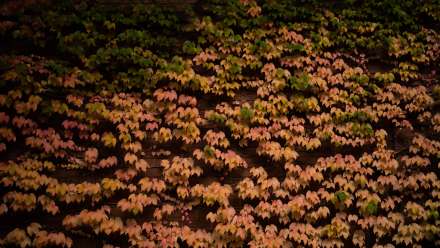Be the change that others don’t see
I want to make it clear that my education and success in life haven’t come easy. It has taken a lot of work, a lot of setbacks, a lot of failings – but, with support from some incredible people, I feel like I’ve come good.
The 16-year-old Liz Allen never imagined a moment when she would one day welcome students at one of the world's best universities to a new academic year. But that's exactly what she'll be doing as master of ceremonies at The Australian National University's Commencement on Monday. Will Wright spoke to Dr Liz Allen about her long journey to finding her home at ANU.
Dr Liz Allen will deliver a simple but powerful message to new students joining The Australian National University (ANU) this year: forget all the things that people told you in the past about what you can and can't do, embrace your potential, take risks and don't let the fear of failure get in your way.
"When you're in the thick of extreme disadvantage, you look around and there aren't a lot of role models that indicate you can get out of the circumstances that you're in," Allen, a demography researcher and lecturer from the ANU Centre for Social Research and Methods, says with a candour that is disarming.
"It's an enormous gift when someone can overlook that exterior of disadvantage, and almost see into the future of what can be."
Allen describes herself as a change maker, which means that she speaks uncomfortable truths about society and experiences that hold people back. Follow her on Twitter and you'll see she says what she means.
"High school dropout" hosts this year's Commencement at ANU
On Wednesday, Allen made a big announcement on Twitter: "This high school dropout is MCing the 2022 commencement ceremony at the nation's university!"
"Don't ever let anyone tell you you're not good enough, that your grit won't take you places," she continued.
"It feels incredible," she says of her role at Commencement to welcome students to the 2022 academic year.
"I want to be the person that I needed to see when I was young."
Allen has publicly shared her story about the major challenges she has overcome in her life. In her own words, she described living through sexual abuse, institutionalisation, homelessness, teen motherhood and extreme poverty.
Now, Allen wants to share her journey of becoming a demographer at ANU. She did not take the typical path of completing Year 12 at school, before entering university. Instead, she finished Year 12 at Mount Druit TAFE in Western Sydney. That was in 1999.
Jurisprudence or demography
After giving applied chemistry "a red hot go" for a semester at the University of Technology, Allen enrolled in a social science degree at Macquarie University.
"I took demography by accident, because I had to find an elective," she says.
"It was between jurisprudence and demography, and I couldn't say jurisprudence and I didn't know what either of them were. So I googled them, and demography sounded the most palatable, so I did it."
Studying demography was an awakening for Allen.
"It made me realise I wasn't my history," she says.
"I wasn't problematic. It wasn't my fault that I experienced what I experienced in life - that disadvantage. I realised that it was society that needed to change."
While the discovery of demography was a significant turning point in Allen's life, she struggled throughout the five years she undertook her undergraduate degree at Macquarie. She didn't have the money to pay for text books and other materials students had to buy, and she undertook her studies while juggling work and child care. Allen already had one child before beginning her degree, and she had another during her studies.
"I learned through that process that education is not just what you learn, it's the environment that you're in and it's the experiences that you accumulate to enter the so-called real world," Allen says.
A rocky start in the nation's capital before a new beginning at ANU
Allen finished her undergraduate degree at Macquarie in 2005, and moved to Canberra the following year to embark on a career in the public service at the Australian Bureau of Statistics as a demographer. Life was about to become much, much harder.
"I ruffled feathers in the public service, and I then had my third child and became terribly depressed," Allen says.
"It's not new to me - I suffered abuse as a kid. It was something that I'd become familiar with. The postnatal depression hit me really hard, and I had to resign from the public service."
Rather than "falling into a pit of despair", Allen considered her partner's suggestion to go back to university.
"My partner said to me, 'why don't you go back to university and study a Master degree at ANU?'," she says.
"I thought he was crazy. I was such a mess that I thought, 'okay, I'll enrol, I'm not going to do well, but I'll enrol just to shut him up'."
Enrolling in a Masters in demography at ANU in 2008, Allen found herself immersed in an environment with some of the world's greatest thinkers in demography.
"And what was most spectacular was that I was an equal," she says.
"I was invited to lunches with academics. My economic circumstances were no barrier to participation. I didn't have to pay for learning materials. I was able to participate in a way that I was never able to in education before. I ended up doing really, really well."
So you think I can do a PhD?
Allen finished her Masters in a year, but her academic journey was just at the beginning. With the support and encouragement of eminent researchers and educators at the School of Demography and her partner, she received a scholarship to undertake a PhD in demography in 2009.
"I remember thinking, 'here's this breastfeeding, depression-riddled wash up of a person. You think I could what? Do a PhD?'," Allen says.
She felt like she had found her place for the first time.
"I didn't fit in at mainstream school. I really didn't fit in at my undergrad because I was so different. But I found my home at ANU," Allen says.
"Whenever life got too overwhelming I just plonked myself in the school administrator office at demography and just wailed, and they listened to me, and I'd re-collect myself and be on my way."
Seeing the person I always needed to see
Allen describes a pivotal moment during her PhD when the then Dean of the College of Arts and Social Sciences, Professor Toni Makkai, appointed her as a research assistant.
"I learned how to be an academic from Toni, and she became my mentor," Allen says.
"I learned how to be a change maker. More importantly I learned how to be me without fear of my background. My origin story was not holding me back. It was a gift.
"During my time working with Toni, she would come into my office and we would talk about a whole range of things, but she would share stories about what it was like for her growing up and becoming an academic. How hard it was, the obstacles that she faced. And her vision for education to be accessible and I finally saw the person I always needed to see. She was like me, and she was making change."
Allen finished her PhD in 2015, and soon afterwards she was offered a contract position at the ANU Centre for Social Research and Methods. This role has led to a continuing research and teaching position in demography at ANU. Allen also had her first book published in 2020, called The Future of Us: Demography Gets a Makeover.
"I want to make it clear that my education and success in life haven't come easy," she says.
"It has taken a lot of work, a lot of setbacks, a lot of failings - but, with support from some incredible people, I feel like I've come good."
There's still time to register for Commencement on Monday, 11am-12pm, and you can do so here.


